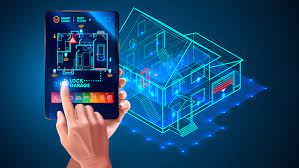Africa has often been a canvas of innovation and resilience. At the epicenter of this energy, Africa’s technological landscape has experienced significant advancements in recent years and this digital transformation has paved the way for the rise of smart home technology, empowering individuals to create intelligent, automated, and secure living environments.
Kenya stands tall, emerging as a powerhouse in technological adoption. As the winds of change sweep across its vast landscapes, the concept of smart homes is gradually gaining momentum. Kenya’s rapid digital transformation has set a robust foundation for technological advancements. With over 80% of its population accessing the internet and mobile penetration reaching new heights, Kenya’s readiness for the digital age is evident. This connectivity forms the bedrock upon which smart homes are built.
Developers are increasingly acknowledging the demand for homes that offer more than just a roof and walls, but more of convenience, security, and a touch of luxury. For example, one of the leading real estate companies in Kenya, Cytonn has developed upscale residential projects in Nairobi. Their developments often come with modern amenities, integrated smart home systems, and heightened security features.
As a pioneer in the world of electronics, Samsung is actively shaping the blueprint for the smart homes of tomorrow. Samsung’s smart home journey was seeded in their commitment to enriching lives through technology. At its core, Samsung views the smart home not as a luxury but as an evolution in how humans live, work, and interact with their surroundings. Their vision is not just about connecting devices, it is about connecting lives.
One of the primary pillars of Samsung’s smart home vision is seamless interaction. With the integration of Artificial Intelligence (AI) and the Internet of Things (IoT), Samsung envisions a home where devices do not just operate but communicate. From refrigerators suggesting recipes based on their contents, to washing machines choosing the perfect cycle for your clothes, it is about creating an ecosystem where devices understand and anticipate user needs. They have introduced a Smartthings app, which is used for controlling Samsung smart devices ranging from TVs and projectors to ovens and washing machines, it is a familiar app in many homes and plays a vital role in a smart home.
At its core, Samsung views the smart home not as a luxury but as an evolution in how humans live, work, and interact with their surroundings. Their vision is not just about connecting devices, it is about connecting lives.
Furthermore, the ability to harness and manage energy efficiently is a cornerstone of smart living. As energy costs rise, the allure of homes that can intelligently manage and even produce energy becomes undeniable. While the trajectory seems promising, challenges persist. High costs of smart devices, coupled with irregular internet downtimes, can hinder seamless smart home experiences. Moreover, there’s a pressing need for localized solutions tailored to Kenya’s unique needs and cultural nuances. For example, as a segment of the overall population, GSMA places the mobile internet penetration rate in Kenya at 27% of the people, representing one of the highest five-year growth rates in Africa.
There needs to be initiatives to foster tech education, combined with investments in infrastructure, which will lay the groundwork for a brighter future. Collaborations between local startups and global tech giants like Samsung can usher in innovations tailored for Kenya’s demographic.
In conclusion, the fusion of tradition and technology paints a hopeful picture for smart homes in Kenya. As the country strides forward, the dream of homes that resonate with intelligence, efficiency, and convenience is slowly, but surely, turning into a palpable reality.
























